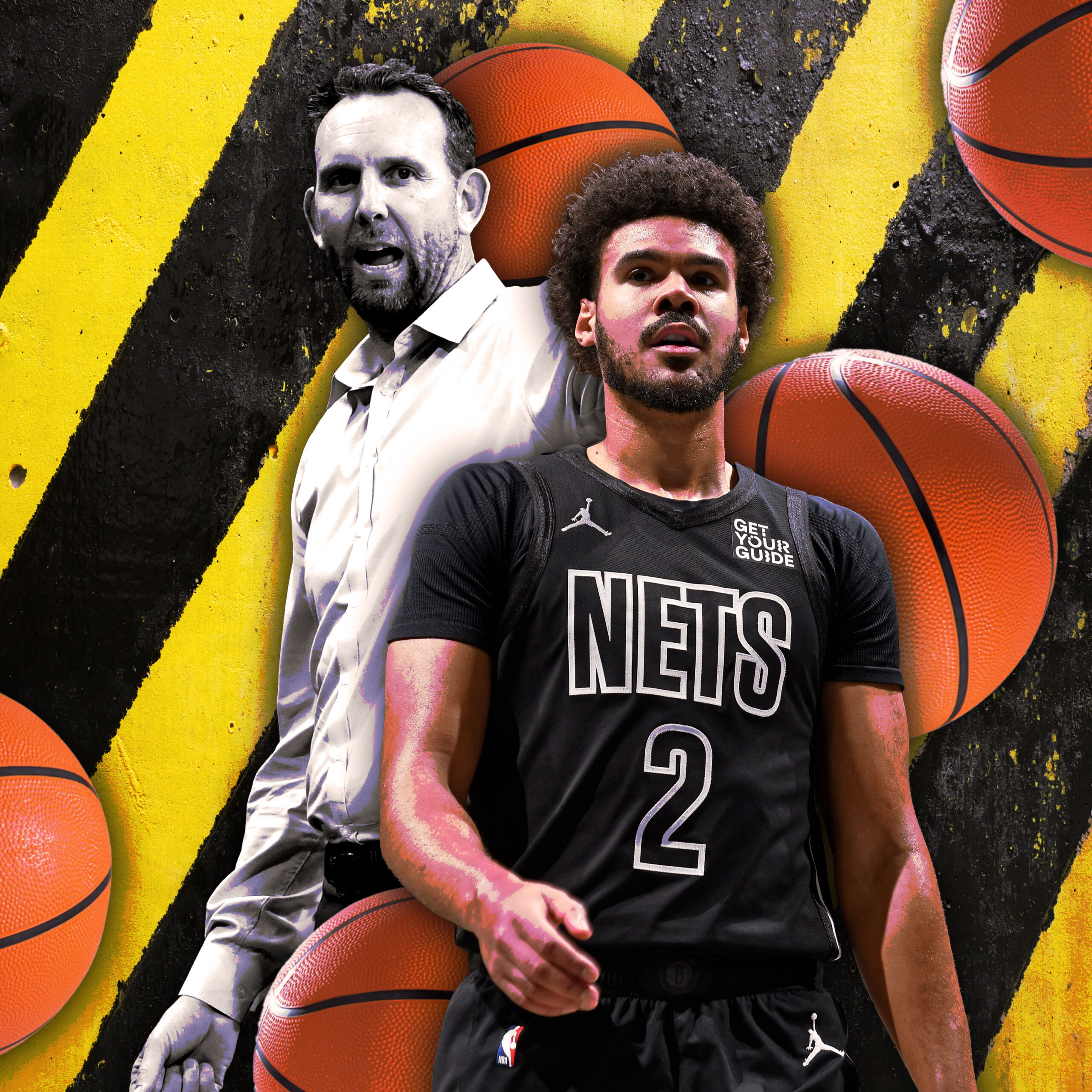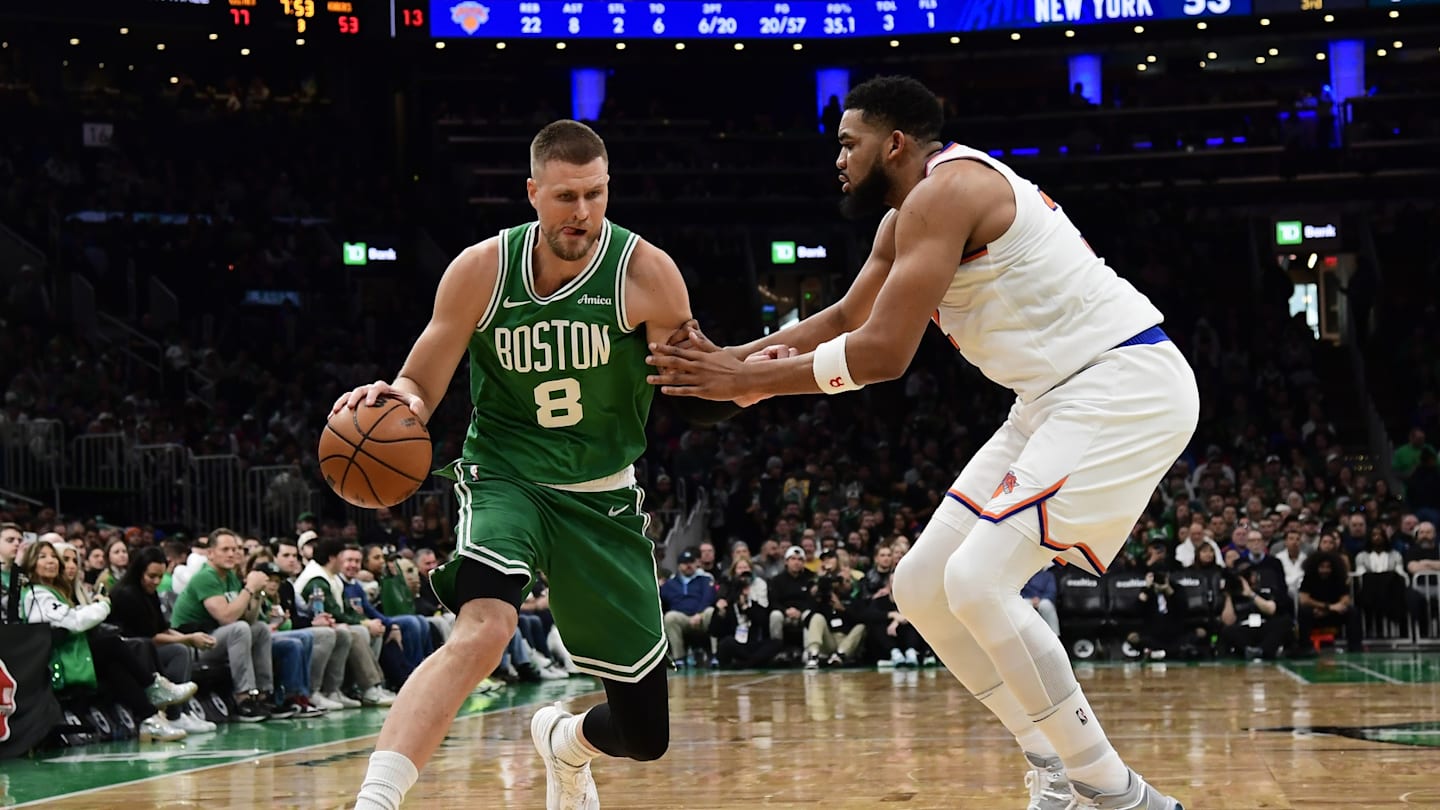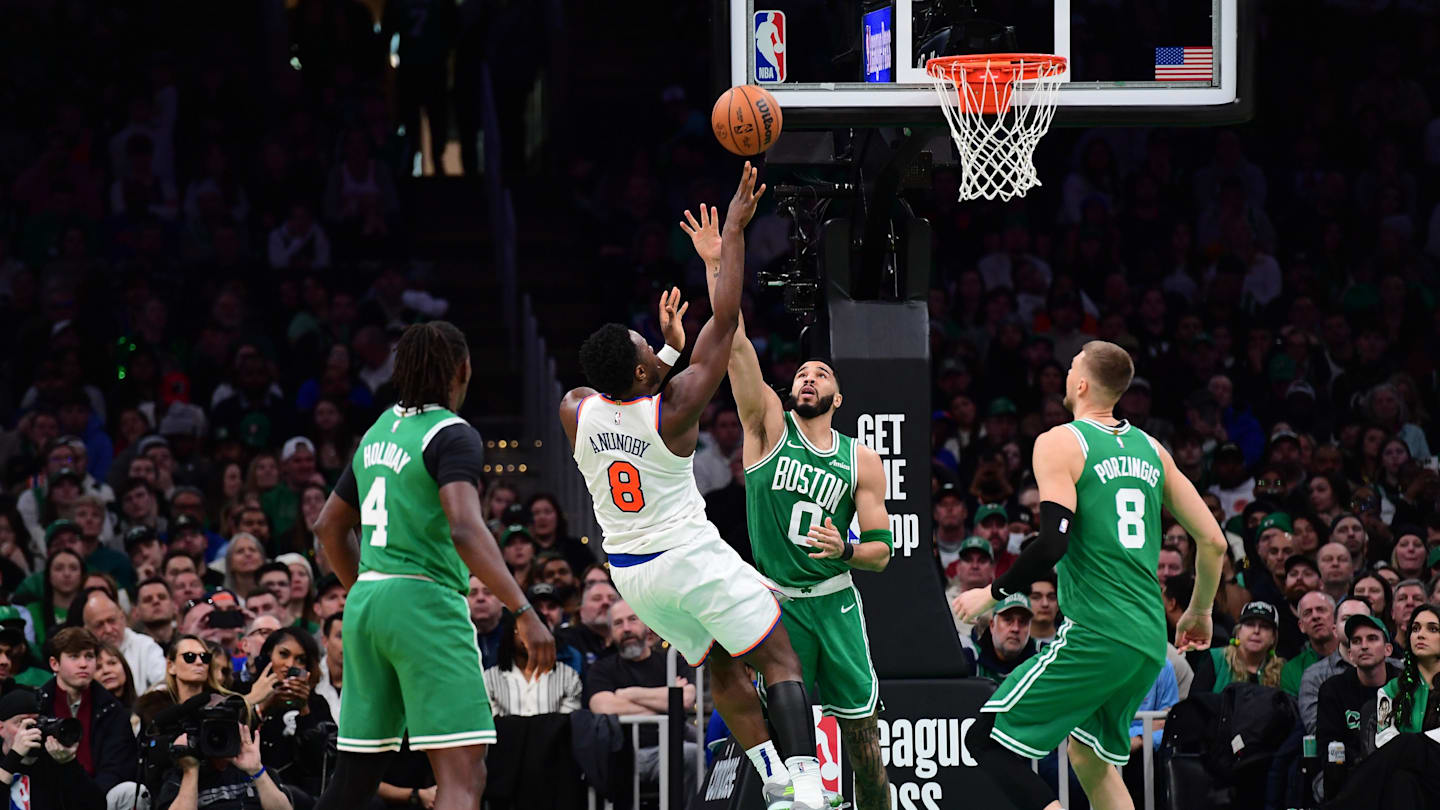The Brooklyn Nets Are Still Dreaming Big, Despite All the Nightmares

So continues the march toward inevitability. On the final Sunday of 2024, just two weeks after trading veteran playmaker Dennis Schröder to the Golden State Warriors, the Brooklyn Nets took another step in one of the most audacious rebuilds in league history by bringing back a familiar face. The Nets acquired D’Angelo Russell, Maxwell Lewis, and three future second-round picks from the Los Angeles Lakers in exchange for Dorian Finney-Smith and Shake Milton.
Call it an artifact of nostalgia; Russell’s first stint with the Nets was meaningful for both parties. DLo became an All-Star in 2019 as the offensive focal point in what might be the only pure and joyous season the Nets have had in more than a decade. Just as corporate profits are a leading indicator of inflation, Russell’s presence historically signals a change in the air in Brooklyn. His re-arrival (and Cam Johnson’s impending departure) gestures toward a clean break from the past half decade of a Nets team held hostage—again. Yet what the Nets are now building is in direct conversation with their lamentable past. In a sense, they’re building themselves in the image of Russell’s poetic, mildly delusional self-determination: Public humiliation has done nothing but molded me into the killer that y’all see today.
As you watch these Nets move both on and off the court, it’s hard not to see them as a miracle. They’re standing on the ashes of one of the worst trades in NBA history and one of the greatest mirages we ever thought we’d caught a glimpse of. Through it all—from KG to KD, everything in between, everything since—they’re here. They’re neither monumentally fucked nor hamstrung by the whims of itinerant superstars. But those scars never fully go away. These Nets exist in the context of all that … you know. The chance to mortgage away a team’s entire future for its present ought to come only once in a generation; the Nets managed to strike at the opportunity twice in the span of a decade, both times failing in uniquely spectacular ways. Those superteam fever dreams encircle each other, forming the double helix at the core of every Nets team to come. And in the present, the front office is doing the only thing it knows how to: trading its way through it. A Nets franchise that has been doomed, then saved, then doomed, then saved by trades over the past three presidential administrations will once again serve as a linchpin in what could be the most consequential deals before the February 6 buzzer. But these days, they’re the ones with leverage. They’re the ones asking for teams to sign away their souls.
They have every right to. After all, they have the most coveted player leading into the trade deadline. Who would have thought that player would be Cam Johnson? Except, have you seen Cam Johnson play lately? The man is tracing the golden ratio on hardwood—curling from the restricted area in the paint, going around a back screen, and taking a dribble handoff from the top of the arc. From the wing, he is jutting his body’s positioning left before cutting right, shaking his defender to create new windows of possibility, whether the ball ends up in his hands or not. He knows that eyes are on him regardless. He is moving, constantly moving. The Nets offense moves with him, revolving around a career plug-and-play role player in ways few could have imagined even a year ago. Good things happen when he’s on the court. The numbers are staggering: In the month of December, Johnson averaged 22 points per game, shooting nearly 50 percent from the field and 44 percent from 3 on 7.5 long-range attempts a contest; his full-season numbers aren’t too far off from that. He has a higher true shooting percentage than Nikola Jokic, who is in the midst of one of the greatest offensive seasons ever.
Johnson is a fascinating lens into just how much basketball has evolved in the past two decades. The baseline level of skill is higher than it’s ever been, and players are expected to meet a certain standard earlier and earlier in their careers. It’s skewed the perception of what we should value in a player—both Johnson and former Nets and Suns teammate Mikal Bridges were older prospects taken in the late lottery, with skill sets deemed safe and high-floor. Part of what has made the Nets’ reconstruction plan so fruitful is the extraction of latent potential from high-quality starters that a contender like Phoenix didn’t have the patience to mine. But those first impressions are sticky. In most circles, the image of Johnson in one’s mind’s eye is that of a garden-variety catch-and-shoot wing—but transport him to any other era of basketball, and he’d be an alien. He’s producing the kinds of numbers that made Rashard Lewis a two-time All-Star in the mid-to-late aughts, yet Johnson maintains the profile of an overperforming role player. The idea that an athlete of that now-middling archetype would attract so much interest on the trade market should be preposterous.
But he is. At least half of the league is inquiring about his services. He’s a player that requires no imagination as far as fit, though imagination might help unlock all there is to his game. Johnson’s offensive glow-up has taken center stage, but it wasn’t too long ago that he was given crucial defensive reps against the likes of Giannis Antetokounmpo and Luka Doncic deep in the postseason in Phoenix. Acquiring Johnson would be an act of invisible mending: Repairs and reinforcements to a team’s offense and defense would be seamless—like they were always meant to be that way.
Yet, less than two years ago, Johnson was arguably the least essential asset in the trade that sent Kevin Durant from Brooklyn to Phoenix. Bridges was coming off a season wherein he was the Defensive Player of the Year runner-up, and five unprotected future first-round picks is five unprotected future first-round picks. Bridges would go on to yield even more first-rounders, and, if the Nets have their way—and they will!—trading Johnson will do the same. Brooklyn currently has 15 first-round picks through 2031, the most in the league; imagine telling that to someone 10 years ago.
For what feels like an entire era of NBA history, Brooklyn has suffered the plight of Prometheus—punished for making a bold, shortsighted decision that angered the gods. For stealing the gift of fire and delivering it to mankind, Zeus chained Prometheus to a rock, where an eagle descended on him daily to peck through his liver, which would regrow the next day, allowing for the same agony ad nauseam. It’s not so different from what the Nets suffered through most of the 2010s. Ill-fated trades for the husks of Deron Williams, Gerald Wallace, Joe Johnson, Kevin Garnett, and Paul Pierce left the Nets without control of their first-round pick for seven of eight seasons between 2011 and 2018.
In the summer of 2019, after the debts had been cleared and the team had found a modicum of promise worth holding on to, the Nets took on an unexpected windfall of value: the summer’s marquee free agents, Durant and Kyrie Irving, decided that they wanted to be in Brooklyn. Come 2021, the Nets were faced with yet another Faustian bargain: trade for James Harden and create a real superteam, at the cost of once again relinquishing control of their first-round draft picks for seven seasons. You know what happened next. Scary hours, things of that nature. As the story goes, Prometheus eventually gets bailed out by Zeus’s son Heracles. But day after day, year after year of getting mauled by an eagle, you’d have to think about the nature of suffering itself. Imagine if he found a way to break the cycle—to make the torturous monotony work for him. The gods sought to punish Prometheus for eternity, an endless iteration of the same horror. But what if regeneration were just another divine gift to be stolen and repurposed?
The walls quickly caved in on Brooklyn’s second superteam—with Harden, Irving, and Durant all systematically traded away in the span of a calendar year. General manager Sean Marks knew when to pull the plug on a grand experiment: as was the plan back in 2017, so it goes in 2024. And in doing so, the Nets finally have the kind of rebuilding situation that Marks sold former owner Mikhail Prokhorov on when he was hired in 2016: a measured, long-view approach to getting out of the muck. Giving up the superteam ghost has netted Brooklyn 13 first-round picks, seven second-round picks, and counting. In total, the Nets have 31 draft picks through 2031, behind only the Oklahoma City Thunder, who have 32. For years, the Nets watched as their picks turned into gold for others: The Blazers got 11 years of Damian Lillard, who was originally a first-round pick traded away for Gerald Wallace; the Celtics built a perennial contender and the reigning championship team around Jaylen Brown and Jayson Tatum, both children from the same transaction tree (we aren’t allowed to talk about James Young). The Nets may soon know what it feels like to be on the other end of that arrangement.
All the while, a foundation is being put in place for what lies ahead. Head coach and player development ace Jordi Fernández has this jury-rigged team playing hard and on task—not unlike former head coach and player development ace Kenny Atkinson did from 2016 to 2020—even as the rest of the league views the Nets less as a team and more as the outdoor rack of clothes at a Salvation Army thrift store. After a few seasons spent in a star-drunk fugue state, it’s as if the team is back in 2019—except Russell is now 28 and the team has enough draft picks to fill out a Baskin-Robbins flavor board. The Nets are a bad team that isn’t that bad—with a fan base that can, for once, air its grievances by asking why the team isn’t worse. Isn’t it astounding how normal that all sounds? When, for years, the Nets were anything but? For the greater part of the previous decade, the franchise occupied a purposeless zone of existence: nowhere near good enough to win, but also stripped of all incentive to lose. Nets fans (and fans of other teams across the league smelling blood in the water) are ready for this squad to tank. If not for a franchise-altering prospect, then at least to know what it feels like to have the freedom to.
The Nets have not drafted in the lottery since 2010—since before the move from New Jersey to Brooklyn!—despite having the seventh-worst win percentage in the league during that 14-year time frame. That should be impossible. They selected Derrick Favors no. 3 overall that year; his entire rock-solid 12-year NBA career has come and gone in that time and space between. Before last June’s draft, the Nets reacquired their own 2025 and 2026 picks from the Rockets, sending away a 2025 pick swap, a 2027 first-rounder, and two 2029 first-rounders. I can see that your eyes are glazing over. Apologies. Just know: The Nets recognize the game-changing top-tier talent in the upcoming draft classes and made moves accordingly. For the first time in a long time, their luck and their destiny—wherever they take them—are truly their own.
There was a sign that hung outside Marks’s office in the team’s Brooklyn practice facility. On the sign was a maze pattern with a message he’d cribbed from some airline magazine he’d flipped through. “There are no shortcuts,” it read. “Strategic thinking wins.” The irony is delicious in hindsight, but is there anything more human than not listening to one’s own advice? Time has passed, and the course has been corrected. In short time, the Nets have reverted to the kind of incubator that produced the feel-good 2019 team of non-stars that became a surprise sixth seed in the East, leveraging the strength of their long-standing player development ethos. Bridges moonlit as a self-creating alpha long enough to spike his valuation; Johnson has done the same.
Brooklyn is essentially pitching basketball’s American Dream myth: Come to Brooklyn and self-actualize, if only for a moment. This is what it can do with supporting players; imagine what it could do with a handpicked, homegrown superstar. Imagining is easy. The past four NBA champions—the Celtics, the Nuggets, the Warriors, the Bucks—found their cornerstones through the draft and never let go. Actually finding that player? That’s the hardest part of this entire endeavor, and it would go a long way in salvaging Marks’s legacy in the front office. They’ll have more cracks at finding that star than the team could have ever thought possible.
Danny Chau
Chau writes about the NBA and gustatory pleasures, among other things. He is the host of ‘Shift Meal.’ He is based in Toronto.Related
NBA: Mark Cuban says he would have asked for more…
Feb 13, 2025; Dallas, Texas, USA; Mark Cuban laughs during the second half of the game between the Dallas Mavericks and Miami Heat at American Airlines
NBA Scout Reveals Why Celtics Can Easily Beats Knicks in…
The Boston Celtics are one of the teams who are expected to be a contender at the end of the season. They are the defending NBA champions, so they feel like the
Nikola Jokić gives peak Nikola Jokić interview with Scott Van…
Nikola Jokić is still rewriting the record books — and treating it like just another day at the office. In a 149-141 overtime win over the Phoenix Suns
Knicks’ Struggles vs. NBA’s Elite Explained
The New York Knicks are one of the best teams in the NBA, but as of late, they have been defined more by their struggles than their triumphs.The Knicks are 0-7













